

Joanne S-L
Sudden Shift to Online Learning Revealed Gaps in Digital Literacy, Study Finds. When schools abruptly moved online as COVID-19 swept across the U.S. this spring, teachers improvised and traded tips on what worked with colleagues.
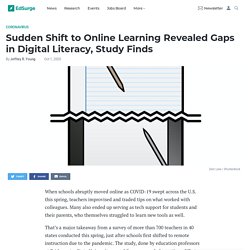
Many also ended up serving as tech support for students and their parents, who themselves struggled to learn new tools as well. That’s a major takeaway from a survey of more than 700 teachers in 40 states conducted this spring, just after schools first shifted to remote instruction due to the pandemic. More Connected? Additional Devices Don’t Lessen ‘Troubling’ Media Literacy Skills. What Is Media Literacy for Students?
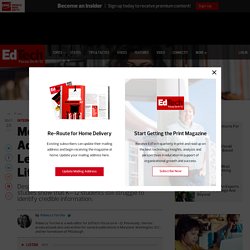
Media literacy is the ability to understand the validity and intent behind a piece of media. The term can apply to any form of media with which students are interacting. New Media Literacy Standards Aim to Combat 'Truth Decay' Teachers have always taught students how to vet and analyze information, but helping them distinguish fact from fiction became especially challenging this past fall.
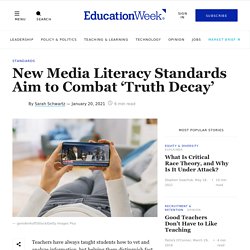
As former President Donald Trump’s baseless claims that the election was stolen circulated on social media and far-right news sites, students asked about conspiracy theories and falsehoods in class, and teachers struggled to figure out the best way to discuss and confront misinformation. This week, the RAND Corporation released a new set of media literacy standards designed to support schools in this task.
SIFT (The Four Moves) How can students get better at sorting truth from fiction from everything in between?
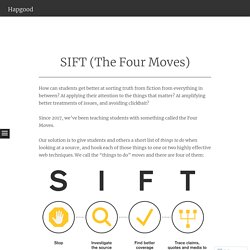
At applying their attention to the things that matter? At amplifying better treatments of issues, and avoiding clickbait? Digital & Media Literacy. Isn't it time to stop Wikipedia shaming? - NeverEndingSearch. I am currently working on a research project with partners from the University of Florida and OCLC.
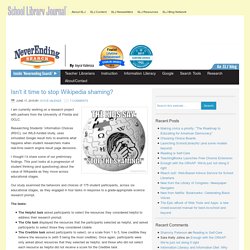
Researching Students’ Information Choices (RSIC), our IMLS-funded study, uses simulated Google result lists to examine what happens when student researchers make real-time search engine result page decisions. I thought I’d share some of our preliminary findings. This post looks at a progression of student thinking (and questioning) about the value of Wikipedia as they move across educational stages. News Literacy Project. How Your Brain Tricks You Into Believing Fake News. Why we need a new approach to teaching digital literacy - kappanonline.org. To assess the credibility of the information they find online, students shouldn’t start with a close reading of the given website.
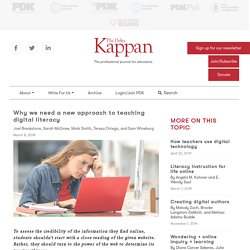
Rather, they should turn to the power of the web to determine its trustworthiness. After the 2016 election, the nation’s most prominent news organizations launched efforts to help Americans navigate the deluge of information — much of it false or misleading — that floods their phones, tablets, and laptops. “Here’s how to outsmart fake news in your Facebook feed,” blared a CNN headline (Willingham, 2016). The Washington Post provided “the fact checker’s guide for detecting fake news” (Kessler, 2016), and the Huffington Post instructed readers on “how to recognize a fake news story” (Robins-Early, 2016). News Literacy Project. How to speak up without starting a showdown. Welcome. Emergingtech 02 24 21 Chat Log. Emergingtech 02 24 21 Slides compr. The Medium is the Massage - Marshall McLuhan. EdWeb Media. Web Literacy for Student Fact-Checkers – Simple Book Production. - The Washington Post.
The Key to Better Student Engagement Is Letting Them Show You How They Learn. A couple of weeks ago during a coaching session, a middle school teacher I work with described a fun math activity.
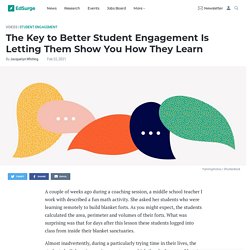
She asked her students who were learning remotely to build blanket forts. As you might expect, the students calculated the area, perimeter and volumes of their forts. What was surprising was that for days after this lesson these students logged into class from inside their blanket sanctuaries. Almost inadvertently, during a particularly trying time in their lives, the students built learning environments over which they had agency. More to the point, they were engaged. EdWeb. EdWebET110 - Feelings Are Not Facts.